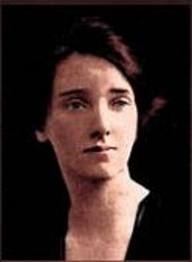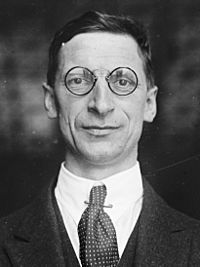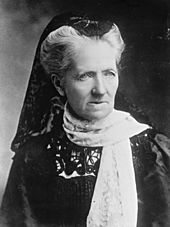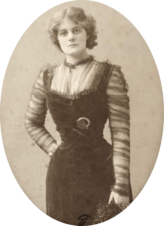Dorothy Macardle facts for kids
Quick facts for kids
Dorothy Macardle
|
|
|---|---|

Portrait of Macardle
|
|
| Born | 2 February 1889 Dundalk, Ireland
|
| Died | 23 December 1958 (aged 69) Drogheda, Ireland
|
| Education | Alexandra College, Dublin |
| Alma mater | University College Dublin |
| Occupation |
|
| Political party |
|
Dorothy Macardle (born February 2, 1889, in Dundalk; died December 23, 1958, in Drogheda) was an important Irish writer. She was a novelist, playwright, journalist, and historian. Throughout her life, she supported Irish republicanism, which is the belief in a united, independent Ireland.
Dorothy was a founding member of the political party Fianna Fáil in 1926. She was also a close friend and supporter of Eamon de Valera, a key leader in Irish history. However, she openly disagreed with how women were treated in the 1937 Irish constitution. Her famous book, The Irish Republic, tells the story of the Irish War of Independence. It is often used to understand the side that opposed the treaty.
Contents
Dorothy Macardle's Early Life and Education
Dorothy Macardle was born in Dundalk, Ireland, in 1889. Her family was wealthy and owned a famous brewery. Her father, Sir Thomas Callan Macardle, was Catholic and supported "home rule" for Ireland. This meant he wanted Ireland to govern itself.
Her mother, Lucy Macardle, was from an English family and supported the British rule in Ireland. Dorothy and her siblings were raised Catholic. However, their mother wanted them to appreciate English culture and the British Empire.
Dorothy went to Alexandra College in Dublin for her secondary education. This school was managed by the Church of Ireland. Later, she studied at University College, Dublin. After graduating, she returned to Alexandra College to teach English.
How Dorothy's Irish Views Developed
While studying at Alexandra College, Dorothy first learned about Irish cultural nationalism. This idea focused on promoting Irish culture and identity. Her experiences seeing the poor areas of Dublin also made her wonder. She questioned if an independent Ireland could manage its own affairs better than the United Kingdom.
From 1914 to 1916, Dorothy lived and worked in Stratford-upon-Avon, England. There, she met upper-class English people who looked down on Ireland. They even called for Ireland to be controlled more strictly. These experiences made her Irish nationalist views even stronger.
When World War I started, Dorothy and her family supported the Allies. Her father helped recruit soldiers in County Louth. Two of her brothers joined the army. Her brother, Lieutenant Kenneth Callan Macardle, died in the Battle of the Somme. Another brother, Major John Ross Macardle, survived the war and received a medal.
Dorothy's Role in the Irish Revolution
Joining the Fight for Independence
Dorothy Macardle joined the Gaelic League, which promoted Irish language and culture. In 1917, she also joined Sinn Féin, a political party seeking Irish independence, and Cumann na mBan, an Irish women's republican organization. In 1918, she was arrested by the police while teaching at Alexandra College.
On January 19, 1919, Dorothy was present at the first meeting of the First Dáil. This was the first parliament of the Irish Republic. She saw it declare Ireland's independence from the United Kingdom. This event helped start the Irish War of Independence.
By 1919, Dorothy became friends with Maud Gonne MacBride, a well-known Irish nationalist. They worked together at the Irish White Cross. This group helped people who were hurt during the war. During this time, Dorothy also started writing to support the Irish nationalist cause.
In December 1920, Dorothy traveled to London. She hoped to create a way for the Irish and British governments to talk. On this trip, she met Charlotte Despard, who supported the Irish side. Despard returned to Dublin with Dorothy.
During the Irish Civil War
After the Anglo-Irish treaty was signed in December 1921, Dorothy took the side that opposed the treaty. This led to the Irish Civil War. With Maud Gonne MacBride and Charlotte Despard, she helped start the Women Prisoners' Defence League. This group worked to help republicans who were put in prison by the new Irish Free State government.
During this time, she also worked with Erskine Childers. They wrote for anti-treaty newspapers like An Phoblacht and Irish Freedom.
In October 1922, Dorothy, Maud Gonne MacBride, and Charlotte Despard spoke at a protest in Dublin. They were protesting the arrest of Mary MacSwiney, a member of parliament. The Free State authorities tried to stop the protest. After this event, Dorothy decided to work full-time for the anti-treaty side. This led to her dismissal from Alexandra College. Soon after, she was arrested and imprisoned by the Free State government. She spent time in Mountjoy and Kilmainham Gaol prisons.
The Irish Civil War ended in the spring of 1923. Dorothy was released from prison on May 9.
After the Revolution: Writing and Activism
Investigating the Ballyseedy Massacre
After the Irish Civil War, Dorothy remained active in Sinn Féin. She became close to its leader, Eamon de Valera, and his wife, Sinéad. Dorothy often traveled with the de Valeras and visited their home. As their trust grew, de Valera asked Dorothy to investigate the Ballyseedy massacre. This event in March 1923 involved the reported killing of unarmed republican prisoners.
Dorothy agreed and, by May 1924, she had completed a report. It was called "the tragedies of Kerry." After her report was released, the Minister of Defence, Richard Mulcahy, started a separate government investigation. However, the government's inquiry concluded that no wrongdoing had occurred.
Helping to Form Fianna Fáil

In 1926, Eamon de Valera resigned as President of Sinn Féin. He left the party after a vote against his idea that members should take their seats in Dáil Éireann (the Irish parliament). De Valera and his supporters, including Dorothy, formed a new political party called Fianna Fáil in May 1926. Dorothy was immediately elected to the party's national executive committee and became its director of publicity.
However, Dorothy resigned from Fianna Fáil in 1927. This was because the new party decided to take their seats in Dáil Éireann, which she disagreed with. Despite this, her views remained generally supportive of Fianna Fáil and de Valera.
A Busy Writer and Broadcaster
Dorothy wrote about her experiences during the Civil War in Earthbound: Nine Stories of Ireland (1924). She continued to write plays for the next twenty years, sometimes using the pen name Margaret Callan.
By 1931, Dorothy was working as a writer for the Irish Press newspaper. This paper was owned by de Valera and strongly supported Fianna Fáil and Irish republicanism. She wrote reviews of theatre and literature. She also wrote investigative articles, such as reports on the poor areas of Dublin. In the mid-1930s, Dorothy also became a broadcaster for the new national radio station, Radio Éireann.
The Irish Republic (1937)
In 1937, Dorothy Macardle published her most famous work, "The Irish Republic." This book was a detailed history of Ireland from 1919 to 1923. Some people thought the book praised de Valera's political views too much. In 1939, she admitted, "I am a propagandist, unrepentant and unashamed."
However, the book was generally well-received. People praised her research, detailed information, and wide range of sources. They also liked her dramatic storytelling. The book was reprinted many times, most recently in 2005. Éamon de Valera believed The Irish Republic was the most accurate account of the period from 1916 to 1926. He and Fianna Fáil often used the book over the years.
A Critic and Anti-Fascist
In 1937, de Valera's Fianna Fáil government created a new Constitution of Ireland. This happened after a successful public vote. However, many women, especially republican women, criticized this new constitution. They felt it suggested that a woman's main place was in the home. Dorothy Macardle was among these critics. She was upset by what she saw as the reduced status of women in the new Constitution.
She pointed out that the new Constitution removed the promise from the 1916 Proclamation to guarantee equal rights for all, "without distinction of sex." She wrote to de Valera, asking how anyone who supported women's rights could agree with it. She also criticized the requirement for compulsory Irish language teaching in schools.
Because of the new constitution, Dorothy joined Hanna Sheehy-Skeffington's Women's Social and Progressive League.
While working as a journalist with the League of Nations in the late 1930s, Dorothy became very concerned about Czechoslovakia. This country was being pressured to give up land to Nazi Germany. Dorothy believed that "Hitler's war should be everybody's war." She disagreed with de Valera's policy of neutrality during World War II.
She went to work for the BBC in London and continued writing fiction. After the war, she campaigned to help refugee children. She wrote about their struggles in her book Children of Europe (1949). In 1951, she became the first president of the Irish Society of Civil Liberties.
Dorothy Macardle's Death
Dorothy Macardle died in 1958 in a hospital in Drogheda. She was 69 years old and had cancer. Even though she was somewhat disappointed with the new Irish State, she left the money from her book The Irish Republic to her close friend Éamon de Valera. He had written the introduction to her book. De Valera visited her when she was dying. She was given a state funeral, and de Valera gave the speech at her funeral.
Dorothy Macardle's Published Works
- Tragedies of Kerry, 1922–23
- Earthbound: Nine Stories of Ireland, 1924
- The Irish Republic (published 1937, 1938, 1951, 1968 and later)
- Uneasy Freehold (1941, which became the 1944 movie The Uninvited), published in the US as The Uninvited (1942)
- The Unforeseen (1946) (a novel set in Ireland) also known as Fantastic Summer (1946)
- Without Fanfares: Some Reflections on the Republic of Ireland (1947)
- Children of Europe: a study of the children of liberated countries; their war-time experiences, their reactions, and their needs, with a note on Germany (1949)
- The Dark Enchantment (1953) (a novel set in Provence, France)
- Shakespeare, Man and Boy (published after her death in 1961)



